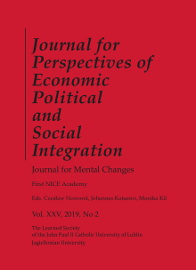Career Transition of Non-European Graduates from European High Education Institutions: Implications for Career Practice
Abstract
Based on several case studies of career services for international students and the transitional experience of non-European graduates from study to work, I provide an integrated analysis of transcripts of semi-structured interviews conducted with career representatives and non-European graduates from German, UK and Dutch universities. I discuss the implications for career practice in light of individual perspectives of non-European graduates, higher education career services and other related institutions. The article reveals factors for career planning and development considering cultural gaps ranging from language issues to differences in the higher education system or recruitment procedures as well as a lack of career provision for international students. It illustrates how career services have reacted to these issues by creating new strategies, including the job role of a career specialist for international students, and suggests new directions for further research and the career development of non-European graduates with regard to participating universities and from a broader institutional perspective.
References
Brandl, K. (2015). Ausgangslage der Career Services an deutschen Hochschulen: Bericht zur Umfrage des CSND. Berlin, Germany: CSND.
Coombes, R. (2014). Supporting international students with careers provision: A review of UK higher education careers service provision and a case study based on the University of Exeter. Journal of the National Institute for Career Education and Counselling, 32 (1): 43-48.
Equality Challenge Unit. (2012). Attracting international students: Equitable services and support, campus cohesion and community engagement. London, England: Author.
Hanganu, E., & Heß, B. (2014). Beschäftigung ausländischer Absolventen deutscher Hochschulen: Ergebnisse der BAMF-Absolventenstudie 2013. Nuremberg, Germany: BAMF.
Hanganu, E. (2015). Bleibequoten von internationalen Studierenden im Zielstaaten Vergleich. Nuremberg, Germany: BAMF.
Higher Education Statistics Agency. (2016). Employment activity and most important activity by level of qualification obtained and mode of study 2014/15. Retrieved March 28, 2018, from https://www.hesa.ac.uk/files/dlhe_1415_table_B.xlsx
Heublein, U., Ebert, J., Hutzsch, C., Isleib, S., König, R., Richter, J., & Woisch, A. (2017). Zwischen Studienerwartungen und Studienwirklichkeit: Ursachen des Studienabbruchs, beruflicher Verbleib der Studienabbrecherinnen und Studienabbrecher und Entwicklung der Studienabbruchquote an deutschen Hochschulen. Hannover, Germany: DZHW.
Home Office. (2018). Statistics on changes in migrants’ visa and leave status: 2016. London, England: Home Office.
Leppanen, J., Saarinen, M., Nupponen, M., & Airas, M. (2014). Hidden competences: Facts and figures. Helsinki, Finland: CIMO.
Mitchell, L.K., & Krumboltz, J.D. (1996). Krumboltz’s learning theory of career choice and counseling. In D. Brown, L. Brooks, & Associates (Eds.), Career choice and development. San Francisco, CA: Jossey-Bass.
Mühleck, K. (Ed.). (2015). Eurograduate Consortium. Testing the feasibility of European graduate study. Final report of the Eurograduate feasibility study. Hannover, Germany: DZHW.
Network for Innovation in Career Guidance and Counselling in Europe. (2016). European competence standards for the academic training of career practitioners: NICE handbook volume II (edited by C. Schiersmann, S. Einarsdóttir, J. Katsarov, J. Lerkkanen, J. Pouyaud, K. Pukelis, R. Mulvey, & P. Weber). Opladen: Barbara Budrich.
Prochaska, J.O., DiClemente, C.C., & Norcross, J.C. (1992). In search of how people change: Applications to addictive behaviors. American Psychologist, 47(9): 1102-1114.
Ripmeester, N., & Pollock, A. (2013). Willkommen in Deutschland: Wie internationale Studierende den Hochschulstandort Deutschland wahrnehmen. Schriftenreihe Hochschulmarketing 8. Bielefeld, Germany: Bertelmann.
Sykes, B., & Chaoimh, E.N. (2012). Mobile talent? The staying intentions of international students in five EU countries. SVR’s Research Unit, Berlin, Germany: SVR GmbH.
Tzanakou, C., & Behle, H. (2017). The intra-European transferability of graduates’ skills gained in the UK. Journal of ethnic and migration studies, 43(8), 1379-1397.
Van Mol, C. (2017). Do employers value international study and internships? A comparative study of 31 countries. Geoforum, 78(1): 52-60.
Wiers-Jenssen, J. (2011). Background and employability of mobile vs. non-mobile students. Tertiary Education and Management, 17(2): 79-100.
Yin, R.K. (2009). Case study research: Design and methods. Thousand Oaks, CA: Sage.
Zeltner, E. (2018a). Career services of international students: Comparison of case studies of higher education institutions in Europe. Journal of the National Institute for Career Education and Counselling, 40(1): 33-39.
Zeltner, E. (2018b). Non-European master’s graduates in the UK and Germany and their transition from study to work (Unpublished master’s dissertation). University of Warwick, Coventry, England.
Zhou, Y., Jindal-Snape, D., Topping, K., & Todman, J. (2008). Theoretical models of culture shock and adaptation in international students in higher education. Studies in Higher Education, 33, 63-75.

